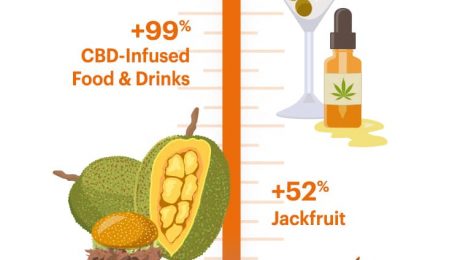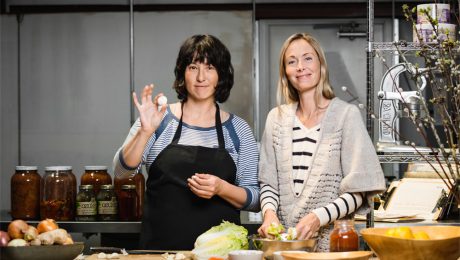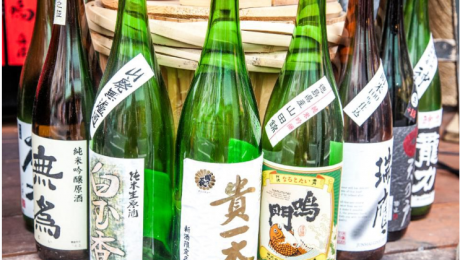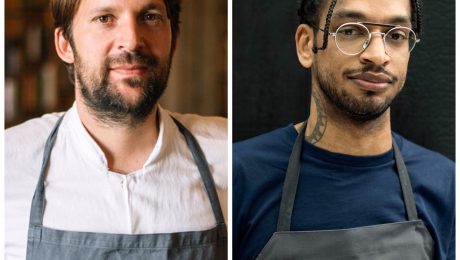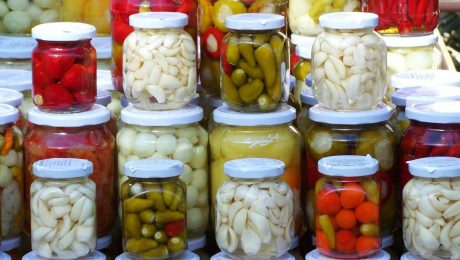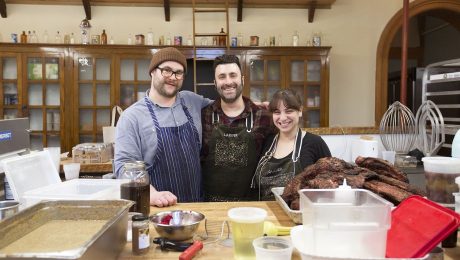Menu Trends: Fermented Foods up 149% in Restaurants
Fermented foods are up 149% in restaurant, the biggest food trend of 2018. In 2019, restaurants should expect customers to be seeking probiotic, fermented foods all year long advises Upserve, the restaurant management company. The funkier, the better. Traditional fermented food like sauerkraut actually saw an 18% decline in restaurants. Americans are craving more adventure on their plate, so kombucha and kimchi are selling well. Also a growing trend: plant-based items.
Read more (Upserve Restaurant Insider)
- Published in Business
Ozukè Founder: Fermentation Will Change Diet & Planet
Blending ancestral kitchen traditions and new scientific research will allow fermentation to change our diet — and our planet.
In a TEDx Talk, Mara King, co-founder of fermented food store Ozukè, shares why she is proudly releasing trillions of good bacteria into the population. Her food philosophy rubs against everything the Food and Drug Administration and state health departments practice. While government agencies enforce strict sanitation standards in the name of protecting American’s food, King preaches that it’s wiping out good bacteria and dumping more toxins into the environment.
When King and co-founder Willow King (no relation) opened their Colorado-based food business, a food scientist from the Denver office of the Health & Human Services Department performed a safety inspection. The food expert was confused by Ozukè’s live, fermented pickles, sauerkraut and kimchi. King: “He said ‘Your product is so weird. We follow all these FDA guidelines in food manufacturing in order to diminish bacteria and here you are making it on purpose.’”
“The food we make is actually super, super, super safe, unlike mots processed packaged fresh foods,” King says. “The reason this food is so safe is not because I’m better at this antimicrobial Macarena than anybody else. It’s because the bacteria are doing the work of making the fermented foods pretty much bomb proof.”
Though numerous cultures have been fermenting for generations (“It’s how humans have been eating raw, crunchy vegetables all through hard winters.”), King notes it’s only in the last 10 years that scientists have been able to map the complex fermentation process. By letting bacteria thrive in its own ecosystem, it “creates a food that’s no longer harmful to humans” and makes a more nutritious product.
“Nature does not operate in a vacuum and neither should we,” King says. “We need to understand the complexity of the world in which we live, then we can start to come up with solutions that do honor our heritage.”
King, who great up in Hong Kong, says older Chinese women store an impressive knowledge of food and medicine. Merging ancient tradition with new science is what will create the living solutions needed to continue living on our planet.
“In fermentation, we have a little trick that we use which is called using a started culture or a mother. I believe that our starter culture…is our human cultural history,” King says. “Once we start tapping this information…we’ll start to come up with amazing solutions, solutions that grow, solutions that rot, solutions that breath.”
Today Ozuke (which means “the best pickled things” in Japanese) still makes pickled veggies, but also teaches fermentation workshops. For more information, visit their webpage.
- Published in Food & Flavor, Health
Redzepi: “Fermentation is a Field That’s Going to Keep Growing”
René Redzepi and David Zilber’s new book, “The Noma Guide to Fermentation,” could have been a vegetarian cookbook, since vegetarianism is trending. That would have been easy. But Redzepi “was very adamant that fermentation is a field that’s going to keep growing, and a book like this is going to help push it forward.” Fermented ingredients now surpass foraged ingredients as “the most important elements” in the pantry at Noma, the fine-dining restaurant in Copenhagen that has been named the world’s best restaurant four times.
Read more (Washington Post)
- Published in Food & Flavor
Sake Sommeliers Growing Mainstay in Restaurants
As sake becomes mainstream, more restaurants are hiring sake sommeliers. These sommeliers – who help pair the best sake with a meal – are educating diners about the fermented rice wine beverage. There’s a misconception that sake can only be served with Japanese food, but the wine and sake director of Zuma operations in the U.S. says: “Sake is becoming more than just a beverage for Japanese cuisine and we, as sake sommeliers, are looking to have sake displayed in all aspects of restaurant culture.”
Read more (Forbes)
- Published in Business
Noma’s Rene Redzepi & David Zilber Speaking in on U.S. Book Tour
René Redzepi and David Zilber will speak across the U.S. on their book tour. Redzepi (chef and co-owner of Noma in Copenhagen, recognized as one of the world’s best restaurants) and Zilber (chef at Nima who runs the fermentation lab) will talk about their new book “The Noma Guide to Fermentation.” The book is also available for preorder on Amazon. Here’s a list of their full tour:
Sunday, October 14 – Toronto
7:00 p.m. at The Isabel Bader Theatre
Presented in partnership with Indigo Books & Music
Details and tickets here
Monday, October 15 – Seattle
6:30 p.m. at The SIFF Cinema Egyptian
Presented in partnership with Book Larder
Details and tickets here
Tuesday, October 16 – San Francisco
7:00 p.m. at JCCSF
Presented in partnership with Omnivore Books
Details and tickets here
Wednesday, October 17 – Los Angeles
8:00 p.m. at the Ann and Jerry Moss Theatre
Presented in partnership with Barnes & Noble
Details and tickets here
Friday, October 19 – Minneapolis
6:30 p.m. at the American Swedish Institute
Details and tickets here
Saturday, October 20 – Chicago
3:00 p.m. at Venue West
Presented in partnership with Read It and Eat
Details and tickets here
Monday, October 22 – New York
7:30 p.m. at the 92nd Street Y
Presented in partnership with Kitchen Arts & Letters
Details and tickets here
Tuesday, October 23 – Washington, DC
7:00 p.m. at Lisner Auditorium
Presented in partnership with Politics & Prose
Details and tickets here
Wednesday, October 24 – Philadelphia
7:30 p.m. at the Free Library of Philadelphia
Presented in partnership with Joseph Fox Bookshop
Details and tickets here
Meet David Zilber – Additional tour dates
Please note the following dates are with appearances by author David Zilber only:
Thursday, October 25 – Philadelphia
10:00 a.m. David Zilber in conversation with Jeff Gordinier, Esquire food editor, at Drexel University
Details and tickets here
Friday, October 26 – Boston
12:30 p.m. David Zilber in conversation with Dr. Pia Sorensen, Harvard University Lecturer on Science and Cooking, at
First Parish Church, Cambridge
Presented in partnership with Porter Square Books
Details and tickets here
Saturday, October 27 – Montréal
2:00 p.m David Zilber in conversation with chef Jonathan Cheung at Appetite for Books
Details and tickets here
- Published in Food & Flavor
How Can Restaurants Safely & Legally Put Fermented Foods on Their Menu? Advice From an Expert
A professor in Culinary Food Arts & Science shares his expertise on how restaurants can safely (and legally) put fermented foods on their menu. Because health code regulations require a time limit foods can go without refrigeration, the restriction makes it near impossible for restaurants to serve their own fermented foods. Creating a HACCP (Hazard Analysis and Critical Control Points) plan approved by the health department helps. Another option is to stop fermenting in the restaurant and instead buy high-quality fermented foods from a third-party that can be refrigerated.
Read More (Restaurant Business Online)
- Published in Business
Anthony Bourdain On a Fermented Future
We’ll remember Anthony Bourdain for opening our eyes to new foods and cultures. This time last year, the culinary TV host declared fermented food as America’s future, adding: “That funk. That corruption of flesh. That’s exactly the flavor zone that we’re all we’re all moving toward.”
- Published in Food & Flavor
Getting Salty with Lauren Friel, who’s opening wine bar Rebel Rebel at Somerville’s Bow Market
Boston wine guru Lauren Friel says, to fix the local restaurant industry, health codes need to be revised. Friel says food regulations restrict chefs from using ferments and cured meats, making it especially difficult to serve authentic Chinese or European food.
An Old-School Deli from a Fermentation Expert Opens in Cleveland
Fermentation guru and chef Jeremy Umansky is opening a restaurant that takes a modern twist on an old-world, Jewish-style deli. Larder: A Curated Delicatessen & Bakery in Cleveland serves fermented favorites like sauerkraut, pickles, giardiniera, pickled smelt, pickled radishes and fermented cabbage leaves.
- Published in Food & Flavor

